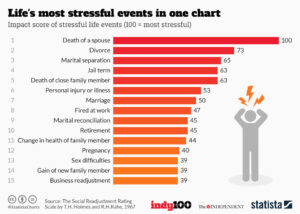
This is Part 1 of a two-part series on STRESS and how it impacts your health, body & mind…
According to the Australian Psychological Association (APA),
“Seventy-two percent of Australians admit that stress affects their physical health, and 64% of us claim it’s not doing us any good in the mental health department, either.
The three main causes of stress in Australia are financial concerns, health issues, and family issues.”
Considering that being chronically stressed has become so mainstream these days, and it is such a regular (daily) occurrence, you might think that stress only affects your nervous system?
After all, that’s where you perceive it to be in abundance – because it is quite literally unnerving!
In actuality, stress, whether the source of it is physical, mental, real, or imagined – also compromises your digestive system, immune system, reproductive system, most major organs, and even your posture and alignment.
It really is a FULL BODY response!
It has been reported that stress is a contributing factor in 5 out of the 6 leading causes of death – heart disease, cancer, stroke, lower respiratory disease, and accidents.
In addition, an estimated 75 – 90 % of all doctor visits are for stress-related issues. Those are all astounding stats, to say the least!
Take a look at the following chart, depicting all of life’s most stressful events… how many have you experienced in your lifetime, in the past few years or many even in the past few months?

Just imagine what could be going on in your body when you’re hit with one (or more!) major stressful events?
The Stress Tornado: the path of destruction stress creates in the body
Let’s take a quick trip through the body and follow stress’s path of mayhem and destruction…
BRAIN & NERVOUS SYSTEM
Chronic stress, or experiencing stressors over a prolonged period of time, can result in widespread damage to the body – and the brain may take one of the biggest hits.
The nervous system has several “divisions”: the central division involving the brain and spinal cord, and the peripheral division consisting of the autonomic and somatic nervous systems.
(don’t worry, I’m not going to get too technical on you, so stay with me here!)
The autonomic nervous system is further divided into the sympathetic nervous system (SNS), and the parasympathetic nervous system (PNS), and has a key role in the physical responses to stress.
When the body is stressed, the SNS generates what is commonly known as the “fight or flight” response. This is when the body shifts all of its energy and resources toward fighting off a life threat (e.g. being eaten by the bear) or fleeing from an enemy (e.g. running away from the bear).
The SNS also instructs the adrenal glands (those hard-working walnut sized ones atop your kidneys) to release life-saving hormones: Adrenaline and Cortisol.
These hormones cause dilation of the blood vessels in the arms and legs (you don’t need so much blood in your limbs in an emergency!), the heart to beat faster, an increase in respiration rate (you breathe faster & harder), and glucose levels in the bloodstream to increase — all to deal with the immediate crisis.
This response by the SNS is quite rapid in order to prepare the body for the acute stress, or short-term stressors.
But, once the crisis is averted (e.g. the bear/heavy traffic/screaming kids/angry boss/spider in your house), the body usually returns to the pre-emergency, more chilled state.
However, as the SNS continues to be called upon to react or be more or less in “fight or flight”, it begins to cause damage in the body.
It’s this continuous activation of the SNS that is the mayhem-maker – as we’ll see when we continue to travel along into the other body systems and organs.

THE HEART
As we’ve learned, Adrenaline and Cortisol – the two major hormones released during the stress response, can cause elevated blood pressure and increased heart rate.
Harvard Health reports that this pattern often leads to a greater chance of developing heart disease down the road.
Experiencing repeated acute stress as well as persistent, chronic stress may also contribute to inflammation in the circulatory system, particularly in the coronary arteries, and this is one pathway that is thought to tie stress to a heart attack.
If you want to steer clear of heart disease (umm, yes please!), reducing your stress levels might be the first place to start, alongside good nutrition and daily exercise, of course!
DIGESTIVE SYSTEM
→ ESOPHAGUS, STOMACH & BOWEL (INTESTINES)
When you’re stressed, your brain becomes more alert to sensations in your stomach. In addition to the “butterflies” you likely feel when you’re nervous, you can also experience nausea, pain, or even vomiting if the stress is severe enough.
And, if the stress becomes chronic, you may develop ulcers or severe stomach pain even without ulcers.
Stress can also affect digestion further down the line, as well as what nutrients your intestines absorb. It can affect how fast food moves through your body (transit time is either too fast or too slow), and you may find that you have either diarrhea or constipation as a result.
Being under constant strain is linked to prolonged and decreased blood flow to the stomach lining, which can result in erosion when exposed to the acidic pH of the stomach.
A combination of stress and the flood of emotions that come along with it can disrupt communication signals between the brain and gut and can bring on or exacerbate several types of digestive disorders, like:
- Irritable bowel syndrome (IBS)
- Gastroesophageal reflux disease (GERD)
- Acid reflux/heartburn – often felt as a burning sensation in the esophagus, throat and a rather nasty, sour taste in the back of the mouth
→ PANCREAS & BLOOD SUGAR
Here’s the simple version: stress hormones can raise blood sugar levels by making your cells resistant to insulin (this is your “fat storage” hormone), which in the long run may increase your risk of developing type 2 diabetes and insulin sensitivity.
If you are no longer sensitive to insulin – and are insulin-resistant, then too much of this fat storage hormone is circulating in your body and not doing its job of dealing with the excess glucose (sugar) in your blood.
Want to guard against Type 2 Diabetes? Then minimize your exposure to stress!
Being stressed also tends to lead to poor food choices, causing you to consume more sugar usually in the form of refined carbohydrates.
Think about it: What foods do you immediately turn to when you’re stressed? I’m pretty sure it’s not a mountain of broccoli!
REPRODUCTIVE SYSTEM & HORMONAL BALANCE

For women, when Cortisol levels are high, Progesterone can be prevented from binding to cells, causing a condition called Estrogen Dominance, which then leads to PMS symptoms or even worse, infertility.
High levels of stress may be associated with absent or irregular menstrual cycles, more painful periods, and changes in the length of cycles.
Stress, distraction, fatigue, etc., may reduce sexual desire — especially when women are simultaneously caring for young children or an ill family member, coping with chronic medical problems, feeling depressed, experiencing relationship difficulties or abuse, dealing with work problems, etc.
For men, chronic stress, ongoing stress over an extended period of time, can affect testosterone production, sperm production, and maturation, and even cause erectile dysfunction or impotence.
YIKES!! If you want your hormones to have a fighting chance – reduce your stress levels!
MUSCULOSKELETAL SYSTEM
We all know that when the body is stressed, muscles tense up. This is the most common, and normal response to stress as it’s the body’s way of guarding against pain and injury – or further injuring itself.

With an acute onset of stress, the muscles tense up all at once and then release when the stress passes – similar to how heart rate and breathing rate also return to normal “resting” conditions.
However, this is not the case with chronic, unrelenting stress as it causes the muscles to be in a constant state of tension.
So, you can imagine, that when muscles are guarded and tense for such long periods of time, this may trigger other musculoskeletal imbalances, and even promote stress-related disorders with far-reaching and long-term effects.
As an example, tension headaches and migraines are associated with chronic muscle tension in the head, neck, shoulders, and even in the jaw. Has your dentist told you that you grind your teeth at night?
Stress is also one of the most common causes of lip and eye twitching. Now you have proof for your spouse that you aren’t voluntarily winking or puckering your lips at strangers!
→ POSTURE & ALIGNMENT
As I wrote about in What The Fascia?! — stress, effects of aging, injury or work-related repetitive movements can cause our fascia (a network of connective tissue that is designed to be elastic and move freely with muscles and bones) to lose its natural elasticity and become shorter, tighter, and more dense or thickened. OUCH!!
Similar to bones, fascia bands are made up of mostly collagen, an important protein building block in the body, which gives them a stretchy texture, but they’re also very tough.
The most important overall function of fascia is to keep everything in its proper place as well as allowing muscles to move independently – sliding and moving alongside one another.
So, you can imagine how unhappy fascia (often due to stress) may lead to poor posture and misalignment.
Also, it can lead to a decrease in “full” breathing, which in turn causes the body to compensate in posture, as the two often go hand-in-hand.
Well, there you have it — the many, many different ways STRESS can negatively affect your health & body, top to bottom!
UP NEXT ON THE BLOG:
Effects of Stress, Part II – actionable ways you can manage stress and maintain balance.
REFERENCES:
American Psychological Association